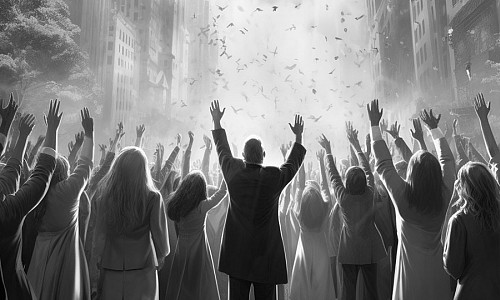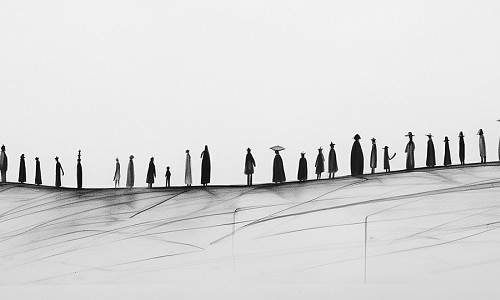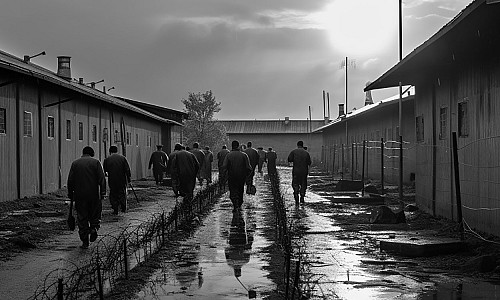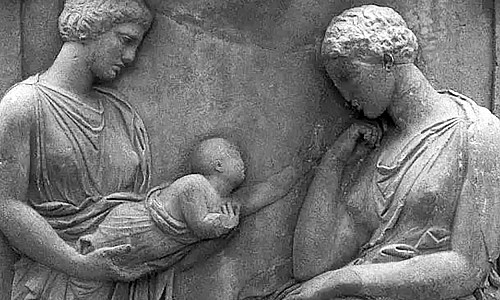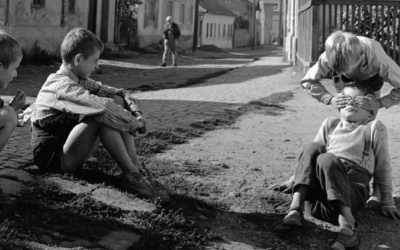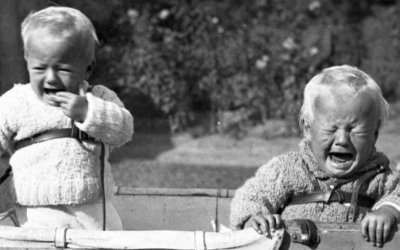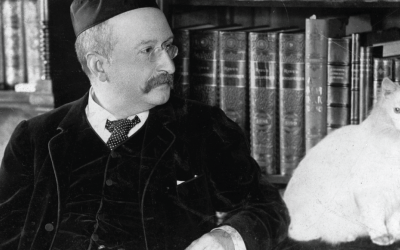Sarah Bakewell celebrates the nitty-gritty of biography.
According to the word’s two Greek sources, to be a biographer is to write, record, incise or scratch (graphein) about bios, or life. This sounds far more profound – more philosophical – thanthe image of a biographer which I fear is more popular: that of a low, hunched creature who snuffles along behind famous individuals, picking up the psychological titbits and scandals they would rather forget. Perhaps because I’m a biographer myself, I prefer to think of us as having the dignity of magnificent artists and thinkers, and as being among those who carve out truths about life in general.
But I must admit straight away that this is just what we are not. Yes, we write about life. No, we do not normally write about it in general. The whole point of a biography is that it is almost shockingly specific. It tells the story of one person, immersed in a historical and geographical context, wrestling both with the quirks of his or her own character and with the situations that chance has singled out for that individual alone. Even when these situations are shared with thousands or millions of others, as in a war, we biographers have to stick with our subject and ask how he or she lived that war. We write about a life that is actually lived, by a concrete individual. Even if we biographise a philosopher who denies the importance of this – who devises universal principles for all human existence, in which particulars and accidents of character are irrelevant – we must still do our job, and perhaps the tension between us will make the work more interesting.
With my last book, which was about the sixteenth-century French essayist Michel Eyquem de Montaigne, the tension was rather about which of us could go further in our devotion to specificity. Montaigne was as concrete as they come. His philosophy was his life. Where he touched on moral or metaphysical questions in his great compendium the Essais, it was to explore how they arose in his everyday routine or his private reading. If he was a philosopher at all, he said, he was only an “unpremeditated and accidental philosopher”, one who wrote whatever passed through his mind at each moment and occasionally happened to cross paths with the great thinkers of the past. His interest was in the existence of one man: himself. Yet this opened up a perspective on human existence in general, for “each man bears the entire form of the human condition”. Even if human beings varied in character – as they did, enormously – they remained united precisely by this shared fact of variability. To study one soul in its oddity was to study everyone in their normality.
Thus, Montaigne ranged through the wildest shores of human experience while staying firmly at home: he wrote about his readings of classical Sceptics and Epicureans, about ethics and theology and politics, but also about his neighbours, his cat and dog, his sexual adventures, his meetings with kings and politicians, his near brushes with death, his painful kidney-stones, his periods of contentment or grief or fear or exhilaration, his mistakes and his moments of vanity or stupidity. “I set forth a humble and inglorious life; that does not matter,” he said. “You can tie up all moral philosophy with a common and private life just as well as with a life of richer stuff.”
Montaigne’s mixture of the personal and the universal was utterly original, but the idea that moral philosophy should be tied up with any individual life at all came from classical tradition. Many Greek and Roman philosophers made it their business to create techniques for good living – a wisdom so practical that we could almost compare it to modern “self-help”. Only later did the majority of philosophers come to see their job as cultivating professional expertise, formulating universally valid laws, and building a self-consistent edifice of thought. Montaigne made no such claims, especially not to consistency. It was, after all, himself he was writing about, and he was always changing, so why try to force his ideas into an artificially rigid form?
A few later philosophers kept the “techniques for living well” tradition going. In the nineteenth century, Friedrich Nietzsche suggested that the only true test of a moral philosophy was whether you could live by it. Alas, he provides a rather poor example of this himself. Suffering from serious mental and physical illnesses, Nietzsche found no comfortable position in the world, and could not even take a train journey without succumbing to overwhelming anxieties and failings of nerve. Does this mean his philosophy was no good for life, and that it failed his own test? I believe not, for I don’t think Nietzsche’s “test” is the sort you simply pass or fail. I prefer to think of it as a variant on Montaigne’s term “essay”, a word he coined from the French essayer, “to try”. This is a kind of testing too, but of the kind that is more like a sample, a taste, or a dipping of the toe into strange waters. Nietzsche’s test is a way of living by philosophy, in such a way that you push it, squeeze it into different shapes, and see what comes out of it.
An even better definition of the philosophical life-test comes from Iris Murdoch. In her Sovereignty of Good, she wrote that any moral philosophy must be inhabited. What counts is not so much whether it passes an exam, as what kinds of occupancy it can support. Is anyone at home in this philosophy? Does it have flesh and bones, or rather joints and floorboards? If you knock, does anyone come to the door?
Both Montaigne and Murdoch were speaking of moral philosophy, but I think this idea of inhabitability can be applied to philosophical disciplines of all kinds. In the early twentieth century, continental phenomenologists picked up on the Montaignesque notion that you can learn something important by closely studying one’s everyday experience of life – “practical objects of every sort: streets with street lights, dwellings, furniture, works of art, books, tools, and so forth”, as the technique’s creator Edmund Husserl put it. His disciple Martin Heidegger based a significant part of his philosophy on the experience of using a hammer, while Jean-Paul Sartre would write at length about watching a waiter in a Parisian cafe.
Sartre’s case becomes even more extreme, for some of his early philosophy seems to have derived from what was basically a bad trip – at least from flashbacks to one. Having been experimenting with mescaline, he found himself bedevilled by the sensation that matter was viscous, bulbous and gloopy, a horrifying sludge from which consciousness struggled like a fly in syrup to extricate itself. Rather than dismissing this as a personal nightmare best forgotten, he saw it as something philosophically fascinating and set out to investigate what it might reveal about the structures of consciousness. This takes “inhabited” thought way beyond moral philosophy, into ontology. It concerns being itself – at least, the phenomenological notion of being as something presenting itself to a particular consciousness in a particular situation. I don’t think it is a coincidence that Sartre went on to advocate a deeply committed, engaged philosophy, one so firmly planted in the political and physical realities of its time that no one should ever seek to put them asunder.
What does all this have to do with the biographer? To me, it suggests a more positive vision of philosophical biography, as something that not only does not pretend to transcend the nitty-gritty of individual life, but which actually celebrates that nitty-gritty. Philosophy itself is an everyday matter. Like houses, philosophical lives are lived and breathed, used and abused. They are acted upon, changed, expanded, worn out and pushed to their limits by the philosophers who inhabit them. Perhaps the biographer is just the one who provides an architectural plan to the philosopher’s house.
What is more, we can point out that they do not live alone. Philosophers are sociable beings. They live together, argue with each other, read and misread each other; they go together through shocks and adventures, get drunk together, snub each other, and borrow or steal each other’s ideas. Sartre almost always had someone nearby with whom he could bash out his thoughts, sometimes vehemently; his companion Simone de Beauvoir was only the best known and longest lasting of a series of colleagues and lovers. As for Montaigne, he did much of his thinking with his best friend, a fellow writer named Etienne de La Boétie who died of the plague just a few years after they met. Like Montaigne, La Boétie wrote about politics, freedom, tyranny, the force of habit and the liberating power of literature and history. Sometimes you can hardly tell which of the two you are reading, so close do they sound, although Montaigne became the greater writer because he had more time. Some suspect that he even wrote one of La Boétie’s books, because it reads like a Montaigne essay. A more likely explanation is that, as they conversed every day, they moulded their philosophies almost unconsciously into partnership. Montaigne continued conversing with La Boétie in his book long after his friend had died; in a sense, they still both live there.
We are all sociable beings. Despite their reputation for introspection, philosophers can be the most convivial of all. A good biographer can provide them with a large, well-appointed family house, with ample rooms and corridors, a big kitchen for cooking things up together, and (for our benefit) plenty of windows through which we can look in. Of course some truths will always evade the biographer, and we will often get the wrong end of the stick. Philosophers make mistakes too. But something exciting will be created, alongside the travesties and betrayals.
Biography at its best is a hospitable art, and also one of the friendliest. We probably should not believe everything it says. But I hope we will never grow out of it.
Sarah Bakewell is the author of How To Live: A Life Of Montaigne In One Question And Twenty Attempts At An Answer.
You might also like...

Subscribe to The Philosophers' Magazine for exclusive content and access to 20 years of back issues.



